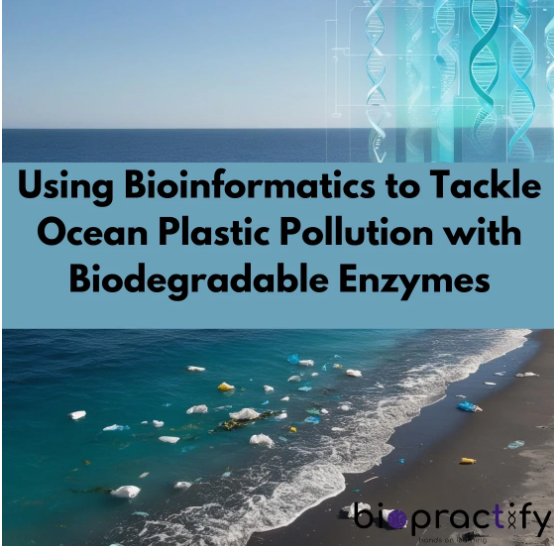BIOINFORMATICS TO TACKLE OCEAN PLASTIC POLLUTION
How Bioinformatics Helps in Fighting Ocean Plastic Pollution
Plastic pollution in the oceans is a growing environmental crisis, harming marine life and ecosystems. Scientists are turning to bioinformatics to develop biodegradable enzymes that can break down plastic waste naturally. This innovative approach is offering new hope in the fight against plastic pollution.
Related: The Role of Biotechnology in Environmental Sustainability
The Role of Bioinformatics in Finding Plastic-Degrading Enzymes
Bioinformatics is a powerful tool that helps scientists analyze massive amounts of biological data. When it comes to plastic pollution, researchers use bioinformatics to:
- Identify natural enzymes that can break down plastics.
- Modify and enhance enzyme efficiency using computational models.
- Predict enzyme behavior in different ocean conditions.
- Speed up research by analyzing genetic data quickly. National Geographic: Plastic Pollution Crisis
What Are Biodegradable Enzymes?
Biodegradable enzymes are proteins that help break down complex materials into simpler substances. In this case, scientists are designing enzymes that can degrade plastic into harmless compounds like water and carbon dioxide. These enzymes can come from bacteria, fungi, or be engineered in labs.
How Scientists Use Bioinformatics to Engineer Better Enzymes
1. Finding the Right Enzyme in Nature
Scientists analyze thousands of microbes using bioinformatics tools to identify those that naturally digest plastic. Some bacteria and fungi already have enzymes that can break down polyethylene terephthalate (PET), a common plastic found in bottles and packaging.
Read More: How Microbes Are Revolutionizing Waste Management
2. Improving Enzymes for Faster Plastic Breakdown
Once scientists find plastic-degrading enzymes, they use bioinformatics to study their structure and behavior. They modify these enzymes to work faster and survive harsh ocean conditions.
3. Testing Enzymes for Efficiency
Before releasing enzymes into the environment, researchers simulate their effectiveness using bioinformatics models. This process ensures that the enzymes can efficiently degrade plastics without harming marine life.
The Future of Biodegradable Enzymes in Ocean Cleanup
The use of bioinformatics in developing biodegradable enzymes is still in its early stages, but it holds great promise. In the future, scientists hope to:
- Develop enzymes that can break down multiple types of plastics.
- Create enzyme-based solutions for large-scale ocean cleanup.
- Use bioinformatics to design eco-friendly enzymes with minimal side effects. Further Reading: The Future of Biotech Innovations
Conclusion
Bioinformatics is playing a key role in the fight against ocean plastic pollution by helping scientists discover and improve biodegradable enzymes. As research advances, these enzymes could become a powerful tool for reducing plastic waste and protecting marine life. With continued innovation, bioinformatics and biotechnology could offer long-term solutions to one of the world’s biggest environmental challenges.
External Resource: UNEP Report on Plastic Pollution Solutions





Top comments (0)